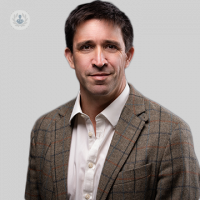The diagnosis process of swallowing problems
Written in association with:There are a variety of causes for swallowing problems, so the right tests and examinations must be done to consider the correct treatment. Professor Stuart Winter, an expert otolaryngologist, has explained what some of the problems are and how he diagnoses them.

What happens first?
The first thing is to take a comprehensive history. I want to understand how long you've had a swallowing problem for, what you find difficult with swallowing and where you feel the swallowing is a problem and at what level. When did it start, did it come on quickly? Has it come on more slowly? Is it progressing? What sorts of foods do you find difficult to swallow? Other things I will ask about include:
- your background
- any other medical conditions you may have and the impact it's having on them
- if you have a cough
- if you've lost any weight
- if you bring food back up
These questions can give a huge amount of information in regards to the underlying cause for the problem.
How is a swallowing problem tested?
Next is an examination of you and your neck, followed by a look at the structures and the anatomy of your swallowing mechanism by testing with a camera through your nose and seeing where foods go during the consultation. From that, further investigations may be needed. An x-ray swallow test, whereby you take a mouthful of a contrast (i.e. blue liquid, yoghurt, cake, etc.) and we look at how the muscles move, is a very good way of understanding where and how the swallowing problem is affecting you.
It may be that an examination of your esophagus further down using instrumentation is required, either through the nose or through the mouth to look at the rest of the esophagus and into the stomach. This can all be arranged depending on cause for your swallowing problems.
How is a swallowing problem diagnosed?
The results from the initial questions, physical exam, and any scans or x-rays are used to determine what is happening and where. Once the location of the swallowing problem is understood, we can direct treatment accordingly.
If you are experiencing issues while swallowing and would like a consultation, you can go to Professor Winter's Top Doctors profile to schedule a visit.


